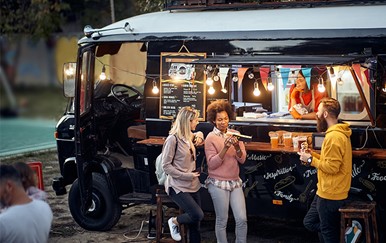If you’re looking to open your own catering van, as with any new business venture, it’s completely natural to have questions. You can do your research but sometimes it’s nice to have all the information in the same place. You’ve come to the right place because today we’re answering the most frequently asked questions all-around mobile catering.
What is a catering van?
They speak for themselves really and if you’ve walked around any market or festival anywhere in the world, you’ll see hundreds. So you’ll know that, basically, they are vehicles that serve delicious street-style food.
However, if you want to get technical, then catering vans are motorised mobile vehicles that are equipped to cook, prepare, serve and sell food. Burgers, stone-baked pizza and chips are some of the most common foods catered for by these vehicles but we’re now seeing vendors get experimental and explore different combinations, flavours and cuisines to offer something different to draw in those crowds. Nowadays, it’s not unusual to see gourmet food on wheels, posh cheese toasties and deconstructed sushi bowls (more mouth-watering dishes in our top 10 food trucks ideas article).
How do I start a catering van business?
With them popping up absolutely everywhere, the popularity of this type of catering is growing quickly and it’s no surprise to hear you want to get in on the action and start your own. However, there are a few things that need ironing out before that journey can begin.
From pitching and permits to licences and training – let’s not forget a basic understanding and knowledge of the industry, this all needs to be organised beforehand. We’ve got you covered though! For a deeper dive, read our dedicated article on how to start a food truck.

How much does it cost to buy a food truck?
When thinking about how much it costs to buy a food truck, my biggest recommendation is to take some time to plan. Start by making a list of everything you’re going to need to fork out for. From the higher expenses that include actually buying the van, decorating and maintaining it to the costs of licences, permits, certificates and parking.
You’re also going to want to think about insurance. If you’re at this stage, why not visit Lexham Insurance? From burger vans to coffee huts, our catering van insurance scheme is designed to offer a policy to suit both you and your catering van.
This leads us onto…
What licenses are needed to start a mobile catering business?
The UK government’s licence finder tool can be helpful in suggesting which licence(s) you may need for your business.
The rules, regulations and commercial pitches and permits available for vending food vary depending on the location and local authority of where you plan on setting up your business.
You can apply for your street trading licence directly via the government website.
What certificates do I need for mobile catering?
Though it’s not required by law, food safety regulations (and your customers) require anyone handling food or drink to prove they can do so responsibly. The simplest way to do this is taking an introductory basic food hygiene course.
If planning to serve hot food cooked via a gas appliance, you’re going to need a Commercial Gas Safety certificate. This ensures that all your equipment is safe and fit for use – so it’s pretty important!
How do I get a pitch for my catering van?
Firstly, when it comes to catering van pitches, you’re going to need to decide where it is you’ll be serving. Typically, there are three different types and that’s roadside, industrial estates and festivals or large-scale events. They all speak for themselves and once you’ve decided which is for you, you can then focus on securing yours.
The way to do this differs for each, for example, for a roadside pitch, it’s a case of finding an available area or one for sale and getting permission by the council. When it comes to industrial estates, you’ll need to find an available spot, discuss your intentions with the landowner and get a contract. On top of that, you may also want to research the area legislations and rules set by the council.
And for festivals, you may need a bit more organisation, starting with contacting the organiser and applying for your pitch via their website or over the phone – you’ll want to get this done early, especially if you’re looking to score a pitch at one of the popular ones. When or if accepted, you’ll then need to take care of the pitch fee.
As you can tell, there is lots to think about and if you want some help or advice read our guide to catering van pitches.

How do I power a catering van?
How you power your van is of high importance because without power, there’s no delicious food and with no food, no money can be made. We don’t want that to happen. So when thinking about how to power your vehicle, you’ll have two options – a diesel generator or a petrol generator. When deciding which is best, you’ll need to consider:
- Its day to day use
- Size
- Weight
- Price
- Noise
What catering van equipment do I need?
This really depends on your menu and style of cooking. Break down your menu and decide what essentials are needed to ensure your food gets to the plate. For example, if you’re serving fried chicken (the clues in the name), a fryer is going to be a very important piece of equipment.
It’s not just the equipment to cook the food, you’re also going to need to factor in how you’ll prep and serve your food plus how much space you have available for storage. If you need some guidance, we go into much more detail in our must-have catering equipment article.

How do I convert a van into a catering van?
To convert a van into a catering van, you’re going to need a plan. There’s no hiding that a project like this is going to be hard work and there are plenty of companies out there who will save you the hassle and convert it for you for a fee but if getting the job done yourself is the dream, you may want to start the process off by considering:
- Your budget. How much is available to spend?
- How confident are you with power tools? We’re talking angle grinders, jigsaws and drills. If the answer is “not very” then you may need to hire help to get the job done properly and safely.
- How much spare time do you have? Again, if it’s “not very much” then paying for labour is probably the most efficient way to convert your van, especially if you’re looking to get it out on the road ASAP.
- Your plan. Having a clear plan of the layout and design ensures you know which direction the project is going in and it doesn’t become distracted or delayed.
After you’ve addressed these initial thoughts, you can start to make more solid plans, such as:
- How the vehicle will operate as a food truck, including the most important part – the hatch. Where will you have it? What will it be made from? How will it open? Remember it needs to be secure and that’s not just from thieves or opportunists but from the weather too, so ensuring it’s watertight and won’t get torn off or flap about in high winds is a must.
- The paint job. Though this will depend on your budget, what your van looks like from the outside plays a pretty important role in how successful and popular it will be. You want it to be eye-catching, fun, quirky and unique to ensure you stand out from your competitors.
- Finishing touches. Think about menu boards, logos, business cards, flyers. Do you want to play music, so customers have some fun whilst queuing? It’s those little extras that will help you get the business.
Once you’ve had a good think, you can get the ball rolling and that little closer to making your dream a reality.

I hope we’ve managed to clear a few things up and provide some answers to those niggling questions that might be preventing you from taking the leap and opening a catering van. If you’re still not sure if it’s for you or not, you may want to weigh up the pros and cons of opening a mobile catering business.










